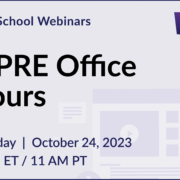How To Analyze An MPRE Question In 5 Steps
How To Analyze An MPRE Question In 5 Steps
The multiple-choice questions that you face on the MPRE can often be very challenging! In this post, we provide tips for how to analyze an MPRE question!
How To Analyze An MPRE Question In 5 Steps
Start by learning the rules!
Many students make the mistake of jumping right into practice questions as they begin studying for the MPRE. It is very difficult to apply the rules if you do not yet know what the rules are! For this reason, it is important that you begin studying by learning and memorizing the substantive material. Be sure to understand What is Tested on the MPRE and make sure that you cover everything that is tested!
Once you have reviewed the material, you are ready to start working on practice questions!
Step one: Read the fact pattern and call of the question carefully
Students often ask what the best approach is to reading a multiple-choice question. Should you read the call of the question first? Should you read the answer choices first? Should you skim the question, and then read it more slowly afterward to focus on what is important?
We recommend reading the fact pattern first, and reading it slowly so that you only have to read it one time. Reading the call of the question first can often waste time and be distracting. It usually doesn’t provide much framework as to what is being tested (as most MPRE questions include similar calls of the question) and can even cause you to focus on the wrong facts as you read the fact pattern.
Whatever you do, you should not read the answer choices first! Many times, the questions intentionally include answer choices that are trying to try to trick you. If one (or more) of the answer choices sticks out to you (even though it is incorrect), you may misread the fact pattern with that preconceived answer in your head.
Once you read the fact pattern and call of the question, stop!
Step Two: Think about what is being tested
Re-read the call of the question if you have to do so. Many MPRE questions use the same or similar calls of the question. Some of the common calls include “is the lawyer subject to discipline?” and “is the lawyer’s conduct proper?”
Be sure to reflect on the MPRE Key Words and Phrases and think about what the call of the question is asking. In particular, ask yourself whose conduct you should be evaluating.
Once you understand the call of the question, carefully analyze the conduct in question. What did the person do that is being called into question? Does that conduct trigger any potentially applicable rules?
Step Three: State the rule
This is where memorization is very helpful! After you identify the issue being tested, try to state the rule word for word. As you practice, you can even practice writing the rule down from memory. As you are taking the actual test, you will not have time to write the rules down, but it may be helpful to take a few seconds to think about the rule.
Stating the rule will ensure you know the exact language that the rule uses. Often, wrong answer choices will misstate the rule, will include statements that sound good, but are not part of the rule, or will state irrelevant rules. The more rules you can state from memory, the easier it will be to eliminate these wrong answer choices!
Step Four: Answer the question
With the stated rule in mind, try to answer the call of the question (again, without looking at the answer choices). For instance, if the question asks whether a lawyer is subject to discipline, you could answer “Yes, because . . . “ or “No, because . . .”
Many students who struggle with the format of multiple-choice questions find this method to be particularly helpful. This method allows you to essentially turn the multiple-choice question into a short-answer question and answer it as you would answer an essay. This will (hopefully) allow you to avoid being tricked by the various multiple-choice options!
Step Five: Pick the answer choice that matches your answer
Now that you have answered the question, look at the answer choices and pick the one that most closely resembles the answer you have already identified! Even after you spot the best answer choice, be sure to read the others to ensure that there isn’t a “better” answer choice. Pay particular attention to answer choices that include the words “if” or “unless” because they change the fact pattern (and you have to consider whether the change to the fact pattern makes that a better answer choice).
But what about timing?
Under normal timed circumstances, you have approximately three minutes per question on the MPRE. It is very likely that this approach will take more than three minutes per question. As you are doing practice questions, it is important that you do them slowly so as to understand the way they test the material and to make sure you are learning the rules appropriately. As you get more comfortable with the material and with the questions, it will become easier and you will start working faster.
Nonetheless, you should also incorporate timed sets of questions into your study. For instance, you can try answering 10 questions in 30 minutes to ensure that you are able to answer the questions under timed conditions.
Try a practice question:
A father hired an attorney to represent his 17-year-old son who was a senior in high school. The son was charged with making a bomb threat at the school. The father paid for the legal representation and the son knew of this arrangement. The attorney advised the son that the son’s best option was to plead guilty, and the son agreed with this recommendation. The father, however, believed that the attorney should fight the charges and seek an acquittal.
If the attorney follows the father’s wishes, is the attorney subject to discipline?
Think about what is being tested:
The call of the question asks if the attorney would be “subject to discipline.” Attorneys are subject to discipline for engaging in any acts that are considered “misconduct.” So, we have to determine whether there has been any misconduct.
Additionally, focus on the conduct at issue: the attorney thinks it is a good idea for the son to plead guilty (and the son, a minor, who wants to plead guilty) while the father does not want the son to plead guilty. Whose wishes control: the son or the father?
State the rule:
This question involves the attorney-client relationship and, specifically, one that includes a minor. Comment [1] to Model Rule 1.14 states, “[t]he normal client-lawyer relationship is based on the assumption that the client, when properly advised and assisted, is capable of making decisions about important matters.”
Answer the question:
Based on the above-quoted rules, the lawyer has to maintain an attorney-client relationship with the son to the extent possible, even though he is a minor. So, allowing the father to dictate whether or not to plead guilty would disallow the son to properly make that ultimate decision.
Again, the call of the question states, “If the attorney follows the father’s wishes, is the attorney subject to discipline?”
The answer would be yes because the son, not the father, is the client and ultimately gets to make that decision.
Pick the answer choice that matches that answer
Here are the answer choices for the above question:
(A) No, because the father is paying for the legal representation.
(B) No, because an attorney should always seek an acquittal for a client rather than advising the client to plead guilty.
(C) Yes, because the son wishes to plead guilty.
(D) Yes, because the attorney does not have any basis for seeking an acquittal.
Of these answer choices, (C) most closely resembles the answer previously stated.
Finally, be sure to review each of the other answer choices and identify why it is an incorrect answer choice.
(A) is incorrect because, regardless of who is paying for the representation, the client is the son, not the father. As such, the son gets to decide whether or not to plead guilty.
(B) is incorrect because an attorney should always do what is in his or her client’s best interest. Seeking an acquittal may not always be in the client’s best interest!
(D) is incorrect because there are no facts in this fact pattern to suggest that the attorney has no basis for an acquittal. Answer choice (C) is a better answer because it is more relevant to the facts presented.
Looking to Ace the MPRE?
- Enroll in our 5-star rated free MPRE Course, complete with expert guidance, an exclusive outline, practice questions, and a one-sheet.
- Tackle the Real MPRE questions — the gold standard for test preparation.
- Elevate your preparation with personalized MPRE private tutoring, featuring a tailored study plan and dedicated MPRE outline.
- Dive into our assortment of complimentary top-notch MPRE resources for your success.








Leave a Reply
Want to join the discussion?Feel free to contribute!